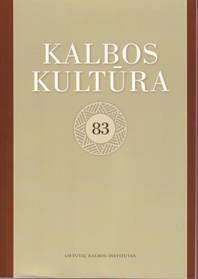Kalbos prestižas ir jo planavimas
Language prestige and its planning
Author(s): Rita MiliūnaitėSubject(s): Baltic Languages
Published by: Lietuvių Kalbos Institutas
Summary/Abstract: Although the discussion of language planning has only recently appeared in the Lithuanian linguistic works, the issues of language standardization, language policy and increase of language awareness in society have always been dealt with during the development history of Standard Lithuanian. The article deals with a relatively new aspect of language planning, i. e. language prestige planning.The aim of the article is to define the concept of language prestige planning and present its treatment in the works of foreign sociolinguists as well as to describe the status of language prestige planning in the current Lithuanian language community, existing both in Lithuania and its exile communities. Due to the current sociolinguistic situation, which is characterized by an increased influence of the English language and other globalization factors arising from international and intercultural contacts, as well as the low prestige of language policy makers in society, these problems become particularly serious.The article contains an overview of the concept of language planning based on theoretical work by foreign sociolinguists, including E. Haugen, H. Haarmann, R. Cooper, H. Kloss, R. Kaplan, R. Baldauf, and D. Ager. The context of language planning and its issues encompasses both the traditional elements, i. e. language status, language corpus and the planning of teaching, and a new component, which is language prestige planning. The article analyzes the major principlesinscribed in the official political instruments of Lithuania, Latvia and Estonia which regulate the issues of language prestige. It also discusses research insights from the studies of language prestige in Lithuania and covers the most important tools for prestige raising implemented during the recent years by the state and private institutions in Lithuania.The following conclusions have been drawn: 1. Foreign experience in language planning shows that the focus of measures and influence is moving from the influence on language to the influence on language users who are encouraged to develop a conscious approach to language matters. It has been realized that success in language planning can only be achieved when individual language users are personally motivated to choose one or another language variety rather than being forced to do so by administrative tools. Hence, the prestige of a language or its variety becomes an object of planning. 2. The official documents on language policy in Lithuania stress the importance of prestige of the Lithuanian language in society and provide measures for its implementation. Yet the subjects of this activity, i. e. state authorities and individuals, do not have clearly formulated objectives and a well-coordinated plan of action. 3. Scarce sociological research in Lithuania has revealed that the prestige of Lithuanian for different reasons, which in particular are related to the national identity, the low status of traditional values, intense emigration etc., is not very high. Thus its planning and strengthening call for the following measures: 1) a language planning strategy that would outline the direction and objectives of language development and define the tasks for language prestige planning, based on the sociolinguistic principles and studies of the current language use; 2) an institution charged with the task of language prestige planning which would involve relevant target groups into prestige planning activities, namely, journalists, writers, translators, editors, teachers, students, interested members of the emigrants’ communities and others; 3) a standard of prestige language variety, i. e. a codification reflecting the current language use.
Journal: Bendrinė kalba (iki 2014 metų – Kalbos kultūra)
- Issue Year: 2010
- Issue No: 83
- Page Range: 231-256
- Page Count: 26
- Language: Lithuanian

